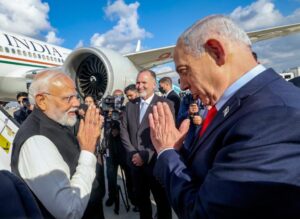US Trying To Hyphenate India, Pak: Congress

Congress leader Sachin Pilot said, "During the 1971 war, America had said that they were deploying their 7th fleet in the Bay of Bengal, and (still) the then government led by Indira Gandhi went ahead and did what was in the supreme national interest."
The Congress party on Sunday demanded clarity from the government regarding whether it has accepted third-party mediation on the Kashmir issue, following recent announcements made by the US concerning India and Pakistan. Congress general secretary Sachin Pilot criticized the attempts to “internationalise” the Kashmir issue and “hyphenate” the two nations.
During a press conference at the AICC headquarters, Pilot stated, “The US move to announce a ‘ceasefire’ between India and Pakistan is unprecedented and raises several questions.” He urged the government to heed the opposition’s call for an all-party meeting chaired by the Prime Minister and a special session of Parliament to discuss these developments.
Pilot expressed surprise at the rapid changes in the situation, saying, “We were all surprised after the announcement of ceasefire was made by the US President through social media.” He emphasized, “An attempt was made to internationalise the issues between India and Pakistan. This is for the first time this has happened,” and insisted that the government must clarify its position while taking the nation and all parties into confidence.
He remarked, “The fact that the US unilaterally announces a ceasefire between two countries so far away is unprecedented. They have tried to engulf the discussion to involve Kashmir, which again is unprecedented.” Pilot questioned, “To say that they will meet at a neutral site, who are they to decide what the neutral site is and who should meet?”
Government sources asserted on Sunday that “India will never accept mediation in the Kashmir issue,” emphasizing that the only matter for discussion is Pakistan returning the territory it occupies illegally. Pilot reiterated, “PoK is part of India, and we have resolved in 1994 to take back Pakistan-occupied Kashmir (PoK).” He further asked, “Has there been a change in that stand? What are the conditions, what are the circumstances, what are the issues on which they will talk, and who is a third country to dictate to India where and when we should meet?”
Pilot raised concerns about the credibility of the ceasefire, questioning, “On what conditions has the ceasefire been declared, and what is the guarantee that such things would not be repeated?” He added, “How can we believe them, and what is the guarantee that such developments will not happen again?”
He also highlighted the need for the government to respond to US President Donald Trump’s statements regarding Kashmir, asserting, “Kashmir is a bilateral issue, and the attempt to internationalise it is not proper.” Pilot called for a special session to reaffirm the 1994 resolution, stating, “It should be made clear that no third-party involvement will be accepted. It is a bilateral issue, and no country, including America, should have a space to intervene.”
Pilot acknowledged the support the government received from all parties following the Pahalgam attack, stating, “We are all proud of what our soldiers and our armed forces have done.” He urged, “I appeal that the government should convene an all-party meeting immediately.”
He noted the contradictions in US statements, saying, “The US had said two days ago, ‘it is none of our business,’ but then the US Secretary of State, President, and Vice President declared a ‘ceasefire.'” Pilot expressed concern over the implications of the US’s involvement, stating, “If a ceasefire is declared from Washington like this, it raises several questions.”
He recalled historical context, saying, “During the 1971 war, America had said that they were deploying their 7th fleet in the Bay of Bengal, and the then government led by Indira Gandhi went ahead and did what was in the supreme national interest.” Pilot emphasized, “We remember that government when national interest was supreme.”





